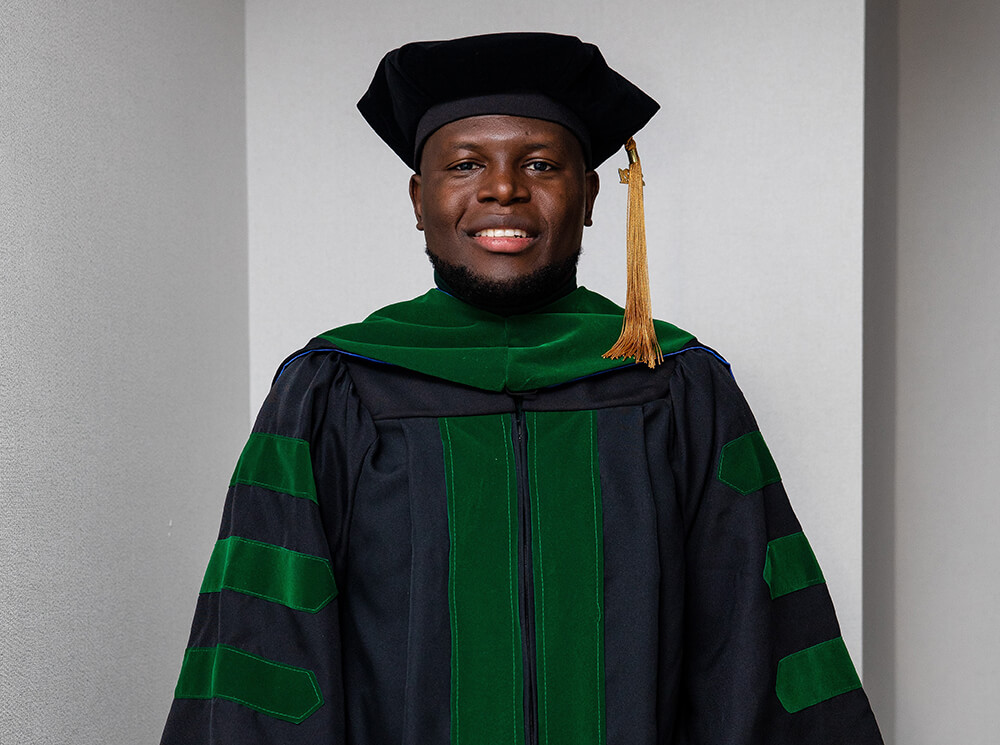Meet the Grads: From Haiti to Harlem
Touro College of Osteopathic Medicine Graduate Achieves Dream of Becoming a Physician through Hard Work, Resilience and a Passion for Medicine

Born and raised in Haiti, Amos Alcius - Touro College of Osteopathic Medicine Class of 2021 - survived the devastation of the 2010 earthquake, restarted his medical education in the United States and in June will begin residency at Tufts Medical Center in Boston in surgery-preliminary anesthesia.
Tell us about your background and journey to medical school.
I was born and raised in a small-town without an option of college. But my parents always sought opportunities for me and my siblings and so at 13 we moved to Port-au-Prince. Initially, I was behind my peers but spent many years improving, which helped me develop a strong work ethic and habits. Over three years I rose to the top of my class and was accepted to medical school in Haiti.
Why medicine?
My early experience with limited access to healthcare drove my pursuit of medicine. I started helping my mother as her health worsened. She used her knowledge of traditional medicine - combining plant-based medicines and diets - to get better. My dad, who was then in the U.S., sent us a blood pressure monitor and I started taking her blood pressure and telling her when to drink her favorite herbal tea and avoid salt. Soon I was checking the blood pressure of friends and family. This experience started shaping my passion to become a physician. I learned to never take an opportunity for granted.
What happened when the 2010 earthquake hit?
I was in medical school and the tragedy impacted my future as well as the country. It destroyed the university and claimed many lives. A year later, I was in the U.S. paving a new path. It was a culture shock. I started over at community college and struggled to understand lectures. I spent countless hours catching up to peers while working multiple jobs. Despite the roadblocks, I started the master’s program at TouroCOM and then the DO program. My belief in the virtues of hard work and persistence were reinforced.
How did the earthquake help prepare you for the pandemic?
Both are unfortunate events that will always have a special place in my life. The earthquake helped me see things differently. The healthcare system in Haiti failed many people. I felt helpless because I couldn’t care for my best friend. During the pandemic, I volunteered with a respiratory therapy team and had direct contact with COVID-19 patients, despite family concerns, because it helped me compensate for the helplessness I felt during the earthquake. Both events taught me the importance of being able to work in an environment that’s constantly changing and being able to step out of your comfort zone.
What impact has TouroCOM had?
The most powerful aspect of TouroCOM was the people I met. Being able to volunteer and provide help to the poorest individuals in the biggest city in America is an opportunity of a lifetime. The experience recalibrated my focus. I appreciate even more that no act of kindness is too small, especially when helping those with limited resources, because it may turn into a movement affecting the lives of many. I never doubt now that one person can make a difference.
At TouroCOM you displayed service and leadership skills as vice president of the Student National Medical Association and fundraising chair for the community health clinic. What achievements are you most proud of?
I’m certainly proud of my contributions while at TouroCOM. When I moved to the U.S in 2011 as a non-English speaker, I had no guidance to navigate the complex medical field and was told by others in my community that medicine is too hard, because they knew brilliant students who were native English speakers and failed, and that my plan seemed unrealistic. I am now celebrating my 10th year in the U.S with DO and M.S. degrees. This is my parents’ wildest dreams.
Why anesthesiology?
In Haiti, I saw first-hand people close to me in distress and I was not able to help them. Because anesthesiologists can give medications through a patient’s IV that take effect quickly, I don’t have to wait until the next visit to the clinic to find out if it worked. This is very satisfying. I also enjoy the procedural aspects of the field, where anesthesiologists perform life-saving treatment at bedsides daily.
What are your goals and hopes for the future?
After residency, my goal is to pursue a fellowship and become a leader in the field, to bring innovative ideas that will overcome challenges that lie ahead for future generations. I want to become an integral part of an academic institution to develop policies and implement them in ways that reduce health disparities. Long-term, my goal is to return to Haiti to help improve higher education and provide affordable learning environments regardless of hometown.
What advice do you have for young people today setting their sights on becoming physicians?
I did not have a mentor and so I used to think that I could do everything on my own. That mindset changed when I met sincere people who offered to help. I would advise finding mentors who share your vision and ask a lot of questions because you must be determined to pursue this journey or you will be surprised by the financial, emotional, and physical burdens. It is extremely important to know why you want to be a physician, as that’s something that can always be used as a compass to guide you. Also, keep your family and friends very close.

